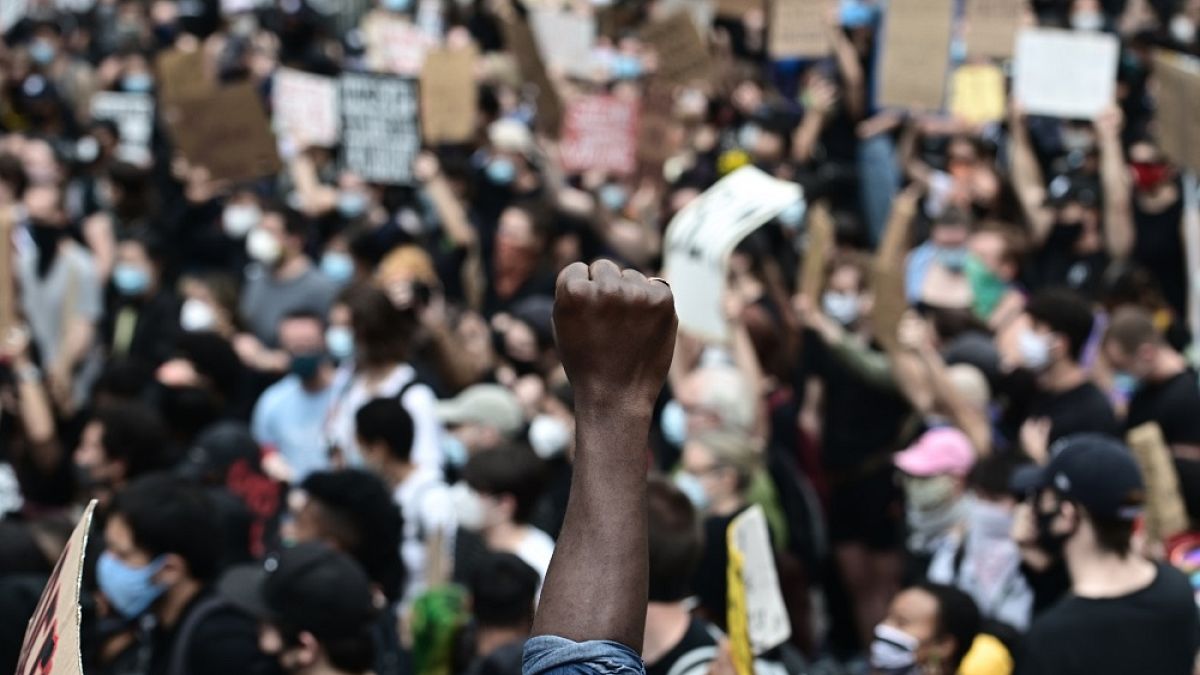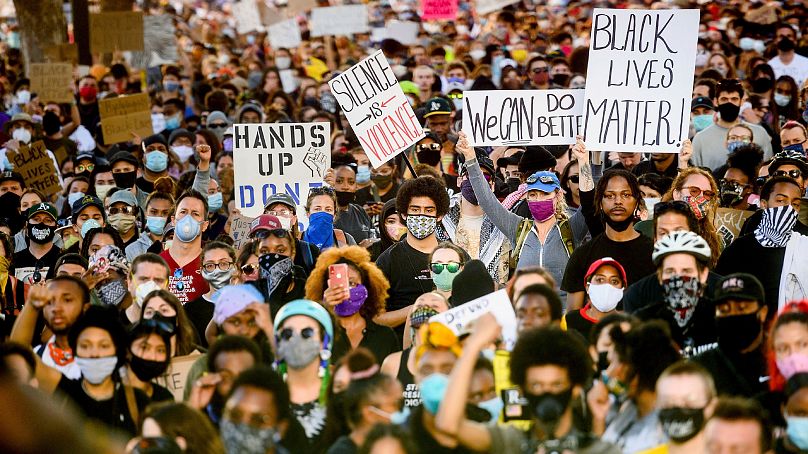Thousands defied US curfews to protest the death of George Floyd while outrage continued to reverberate in Europe on Tuesday.
US protesters defied curfews in New York and other cities on Tuesday in renewed protests against the death of George Floyd, while marches in support of the protests bloomed across Europe.
Floyd, a 46-year-old black American, died on May 25 after a police officer was filmed with his knee on his neck for several minutes, ignoring the handcuffed man’s cries of distress. His death fired up a movement against police violence and racism all over the country.
US curfews
New York Mayor Bill de Blasio doubled down on a citywide curfew on Tuesday, moving it from 11 pm to 8 pm, but rejected pressure from President Donald Trump and an offer from Governor Andrew Cuomo to bring in the National Guard.
People marched in groups of thousands in parts of Manhattan and Brooklyn, defying the curfew, while in Washington, protests were less tense than Monday's. The crowd outside Lafayette Park near the White House started thinning out on its own after 8 pm, an hour after a curfew went into place.
Thousands also walked the streets of Los Angeles in peaceful protest on Tuesday while authorities renewed overnight curfews, and smaller demonstrations dotted other California cities including San Francisco. In Atlanta, hundreds had to disperse after the police fired tear gas to enforce the city's 9 PM curfew, in place since Saturday. In Seattle, Mayor Jenny Durkan told the crowd of protestors that their "voices holding me accountable are important".
The state of Minnesota on Tuesday launched a civil rights investigation of the Minneapolis Police Department in hopes of forcing widespread changes following the death of George Floyd.
The officer who caused Floyd's death, Derek Chauvin, has been fired and charged with third-degree murder and second-degree manslaughter.
Outrage in Europe
Outrage over the death of George Floyd continued to reverberate in Europe on Tuesday.
In Paris, over 20,000 people rallied to protest Floyd's death and demand justice in the case of the death of Adama Traoré, a French black man who died in custody in 2016.
"Police violence, racism, it's not just in the United States," French MP Eric Coquerel said, calling for people to attend the Paris march.
Protests were held in the Hague, Netherlands on Tuesday evening after demonstrations over the weekend in London and Berlin.
EU foreign affairs chief Josep Borrell has called Floyd's death an "abuse of power".
On social media, people posted blank, black images to draw attention to the Black Lives Matter movement.
Football has also been getting involved. Liverpool, Chelsea and Newcastle players have all stopped training to go down on one knee. The "take a knee" protest was started by NFL star Colin Kaepernick.
'Acts of domestic terror'
The US saw another night of chaos on Monday evening as protests over police brutality raged on, with the president using a televised address to threaten to send in the military to regain order.
The National Guard has been deployed in a number of cities, but Donald Trump threatened on Monday to use the force of the military to quell protests.
If governors throughout the country do not deploy the National Guard in sufficient numbers to bring the situation under control, Trump said the US military would step in to "quickly solve the problem for them” as he called violent acts carried out during the protests “acts of domestic terror".
He called on mayors and governors to deploy the National Guard in sufficient numbers to "dominate the streets".
His announcement came as police under federal command forced peaceful demonstrators outside the White House back with tear gas so Trump could walk to a nearby church and pose with a Bible.
One critic, New York Governor Andrew Cuomo, called it a photo op.
Violence escalates
Police officers and national guard soldiers in Kentucky killed a man early on Monday.
Police said they were returning fire after someone in a group shot them first.
Buffalo Police said two people were struck by gunfire during Monday's protest. Meanwhile, a vehicle ploughed into a line of police officers in the city, injuring at least two.
In Louisville, the chief of police was fired following the killing of an owner of a popular barbecue restaurant, reportedly known for offering meals to police officers.
David McAtee died while police and National Guard soldiers were enforcing a curfew early on Monday amid waves of protests over a previous police shooting in Kentucky's largest city.
Police said they were responding to gunfire from a crowd.
George Floyd’s autopsy results released
An autopsy commissioned for Floyd’s family found that he died of asphyxiation due to neck and back compression, the family’s attorneys said.
The new autopsy results found the compression cut off blood to Floyd’s brain, and that the weight on his back made it hard to breathe, attorney Ben Crump said.
One police officer, Derek Chauvin, who had his knee on Floyd's neck in videos widely shared online, has been charged with third-degree murder and manslaughter.
Chauvin and three other officers were fired.
'Police kills' application
Images of US demonstrations and of violent clashes between protesters and police have made it on the front pages of most of France's newspapers and rekindled a debate about police violence towards ethnic minorities in the country.
Floyd's death came a month after a French NGO called "La Police Assassine" ("Police Kills") launched an application to upload footage of alleged police violence.
"Since the beginning of lockdown, there has been a real surge in cases of police violence, especially in working-class neighbourhoods," it said.
"The advantage of filming scenes of police violence with the application is that the videos are sent directly to our servers. In case of damage to your mobile phone or arrest of the latter by the police, a copy of the video is kept by our application," it added.
But several MPs last week tabled legislation that would make it illegal to post images of police officers online in which their faces are recognisable.
"A police officer is in charge of respecting the law of the Republic, I share the strong demand of law enforcement to blur their faces on social networks or in the media. We must protect those who protect us," MP Eric Ciotti, from the right-wing Les Republicains party, argued on Twitter.
The bill has been criticised by Reporters Without Borders, an NGO, which said it would "make it very difficult for journalists to cover a large number of public events, which very often involve the presence of police".
The charity has requested that the bill "which would limit information to citizens on the behaviour of the police, not be placed on parliament's agenda, or be examined."

